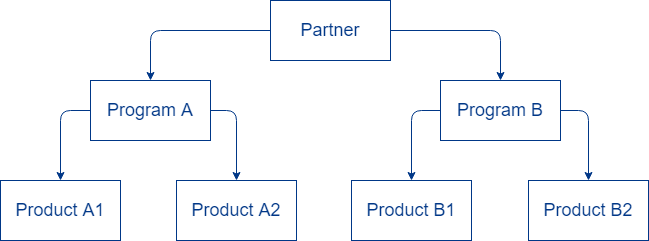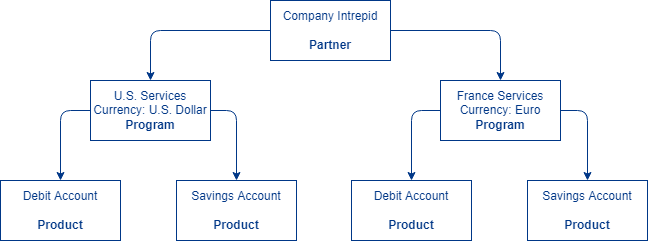Partners, Programs and Products
This guide explains how Galileo’s platform is structured to meet the needs of Galileo clients and clients’ customers. This structure is commonly referred to as "The 3 Ps": partners, programs and products.

The 3 Ps are arranged in a hierarchy.
The 3 Ps structure is a hierarchy in which you, the Galileo client, are called the partner, and you manage multiple programs. Each program contains one or more products.
The partner hires Galileo to manage the financial programs they offer to their end users. (Partners may also be called "providers.")
As a partner, you have one or more programs. A program is a collection of products and services that you want to offer to your customers. A program has a standard set of parameters that apply to all of the products within that program.
"Program" can also describe the contractual relationship between a fintech company and an issuer to bring to market a financial service on behalf of the issuer. Fintechs and issuers work with Galileo to leverage its technology and services (i.e., the Galileo platform), allowing them to offer card or banking services to their customers. Programs also include contractual partnerships with other entities that handle specific aspects of the program, such as payment networks.
Within each program is one or more products. Products are account types that you want to offer to your customers. Galileo offers a number of different products, each with a set of parameters that determine account behavior. Some product types are:
- Spending account (DDA)
- Savings account
- Credit account
- Health savings account
- Embossers (for physical card offerings)
Example: Company Intrepid
In this example, Company Intrepid is a Galileo client.
Company Intrepid is the partner, and they provide debit and savings services to their account holders. Company Intrepid provides these services to customers who are in the United States and in France.
- Partner — Company Intrepid
- Programs — Banking: U.S. dollar, Banking: Euro
- Products — Debit account, savings account

The differentiating factor between the programs is the currency.
Program-level parameters
Parameters set at the program level will drive the behavior of all products within the program. The values for the parameters are determined by your bank to manage risk. Mandatory parameters typically include:
- Currency type
- Max daily limits
- Transaction dispute method
- Parameters for fraud
- Additional services/providers/vendors
- CIP provider (automated KYB or KYC)
- Emboss provider
- Customer Service
- Fraud
- Disputes
If you want to offer products with one or more different parameters than the ones specified in your existing programs, you will need to create a new program with new products. For example, if you want to offer a version of your products in a different country, with a different CIP provider, you would create a new program that contains copies of the original products.
Product-level parameters
Each product has a specific set of parameters and settings that must be set for the product to drive the correct account behavior. These parameters are determined during product setup, and may include:
- Transaction limits
- Point-of-sale daily limit
- Daily ATM withdrawal limit
- Per-transaction ATM withdrawal limit
- Daily over-the-counter limit
- Per-transaction over-the-counter limit
- Total daily cash withdrawal limit
- Total daily limit (point of sale, cash advance, ATM)
- Daily number of ATM withdrawals
- Phone-service limits (only if using the Galileo call center and fees are being charged)
- Load limits
- Maximum card value
- Card-to-card (recipient only)
- Direct deposit
- Mastercard Load
- Sending limits, card-to-card
- Product fees
- Card maintenance fees
- Domestic transaction fees
- International transaction fees
- Service fees
- MCC controls
- Country blocks
- Additional parameters
Identifiers
Galileo uses various types of identifiers to track partners, programs, and products across systems. When you sign on as a Galileo client, Galileo generates several identifiers that distinguish you and your data from other Galileo clients.
If you are using the Program API, Galileo assigns you a provider ID that you include with all of your API calls. This ID is unique across Galileo.
For each program you are assigned a program ID, and each product has a product ID. Both of these identifiers are unique across Galileo. The product ID is sometimes called a PID.
The program ID is present in every record of the RDFs as UNIQUE PROGRAM ID as well as in Events API messages as prog_id.
You will use the product ID every time you create an account with the Program API (prodId), and the prod_id is present in every Events API message as well as in some Program API responses.
This table summarizes how your identifiers are represented across Galileo systems.
| Program API | Events API | Auth API | RDF | CST |
|---|---|---|---|---|
providerId | — | — | — | — |
prog_id | prog_id | — | UNIQUE PROGRAM ID | — |
prodIdprod_id | prod_id | — | PRODUCT ID | Card Description |
Updated 9 months ago
